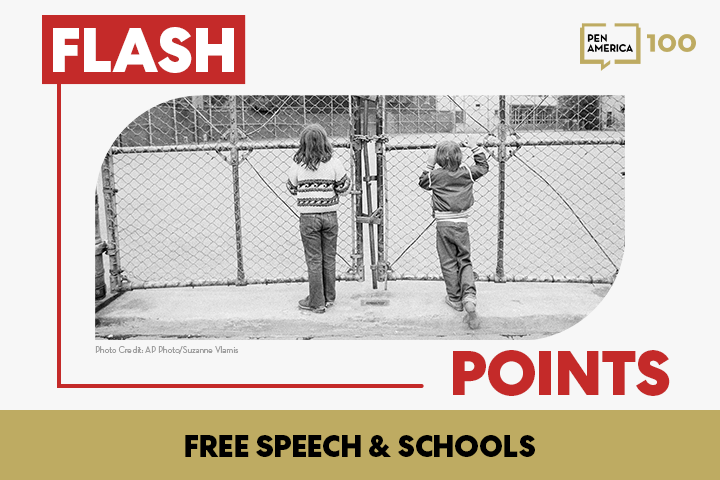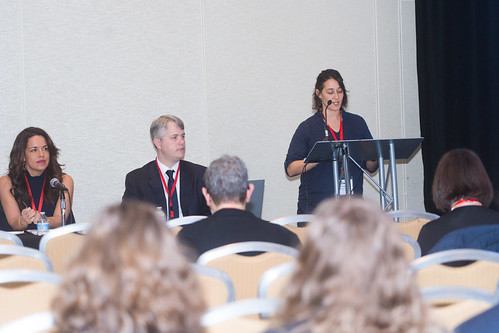Free Speech & Schools

Schools are spaces of learning and discipline where students acquire the knowledge to thrive, but is it fair to presume that knowledge is apolitical? What rights should students have to express political views that may spark division and stir controversy in classrooms? The event explores the range of methods students have found for expressing dissent, from anti-war armbands to banners advertising offensive messages.
DOWNLOAD OUR DISCUSSION GUIDE AS A PDF
Video Highlights
- 4:05 Listen to Nikolai McKenzie (dancer and storyteller) read part of the 1969 Supreme Court decision Tinker v. Des Moines that protected students’ right to protest.
- 12:10 Listen to Brendan Gillis give an introduction to the panel.
- 13:40 Listen to Justin Driver discuss Tinker v. Des Moines and the personal harassment Tinker and their family faced.
- 25:00 Listen to Natalia Mehlman Petrzela discuss the controversy around a sexual education curriculum in California in the 1960 that was initially approved by 90% of parents but then began to draw criticism from parents who argued that it infringed on the rights of parents to teach their children about sexuality.
- 37:00 Listen to Driver discuss a case that was a precursor to Tinker v. Des Moines, West Virginia State Board of Education v. Barnette, which ruled that students do not have to recite the Pledge of Allegiance if it goes against their personal beliefs.
- 43:00 Listen to Petrzela discuss how the sexual education debate relates to issues such as the HIV/AIDS crisis and “Don’t Say Gay” legislation.
- 47:36 Listen to Driver discuss how free speech works differently in school settings versus public ones.
- 51:43 Listen to Petrzela discuss how recent debates about the concept of “harmful speech” in classrooms will have an impact on free speech debates.
- 54:05 Listen to Driver discuss how the Supreme Court treats free speech for students differently than that for teachers, with most recent decisions going against teacher free speech.
- 57:30 Listen to Petrzela discuss how the adjunctification of academia further erodes free speech safeguards.
Have students’ rights always been protected under the U.S. Constitution? In the short video below, listen to Justin Driver explain how the Tinker v Des Moines case calcified students’ rights to free speech and protest at school.
Contributing Scholars
Brendan Gillis is Manager of Teaching and Learning at the American Historical Association and an Assistant Professor of History (on leave) at Lamar University in Beaumont, Texas.
Justin Driver is the Robert R. Slaughter Professor of Law and Counselor to the Dean at Yale Law School. He teaches and writes in the area of constitutional law and is the author of The Schoolhouse Gate: Public Education, the Supreme Court, and the Battle for the American Mind.
Natalia Mehlman Petrzela is a historian of contemporary American politics and culture. She is the author of multiple books, including CLASSROOM WARS: Language, Sex, and the Making of Modern Political Culture (Oxford University Press, 2015).
Jon Zimmerman is a Professor of History of Education at the University of Pennsylvania Graduate School of Education. His scholarship has focused broadly on the ways that different peoples have imagined and debated education across time and space.
From the PEN archives
- “Who Will Speak for the Child?” with Deborah Ellis, Susan Kuklin, Uzodinma Iweala, Praveen D. Fernandes, A.M. Homes, Jonathan Todres, Nadine Strossen, Philip Alston, Walter Dean Myers, and Laura Murphy (2009)
- “Writing About Teenagers” with Alice Childress, Harry Mazer, Paula Fox, Scott Spencer, Hilma Wolitzer, and Josephine Humphreys (1988)
- “The Inspired Scientist: A Program for High School Students” with Harriet A. Washington, Kimiko Hahn, Majora Carter, Sandeep Jauhar, and Tijs Goldschmidt (2009)
For a Deeper Dive
- The Schoolhouse Gate: Public Education, the Supreme Court, and the Battle for the American Mind by Justin Driver
- Classroom Wars: Language, Sex, and the Making of Modern Political Culture by Natalia Mehlman Petrzela
- Free Speech, and Why You Should Give a Damn by Jonathan Zimmerman.
- Whose America? Culture Wars in the Public Schools by Jonathan Zimmerman

